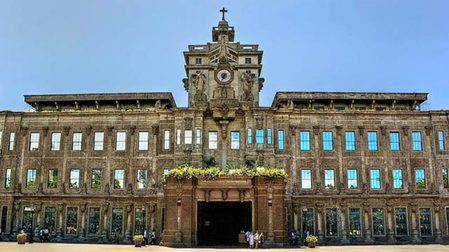SUMMARY
This is AI generated summarization, which may have errors. For context, always refer to the full article.
![[OPINION] UST and the scourge of clericalism](https://www.rappler.com/tachyon/2024/02/tl-clericalism.jpg)
The controversy, initiated by the Office for Student Affairs (OSA) demanding TomasinoWeb to remove its 7-Eleven photo and demand a public apology, has triggered several events that spiraled out of control, tarnishing the public image of the University of Santo Tomas (UST).
The fallout from this incident has resulted in the resignation of the organization’s faculty adviser and prompted a statement signed by more than 700 UST alums. The statement goes beyond the immediate issue, asserting that the stifling of the campus press through OSA is symptomatic “of a much more malignant disease in UST” — one that has been present since its establishment under colonial rule.
I submit that the malignancy has a name: clericalism. In the context of the Catholic Church, clericalism refers to an attitude or mindset that excessively prioritizes the authority and privileges of priests and ordained ministers over the laity, the non-ordained members of the Church. However, clericalism also extends to the laity who, by uncritically supporting clerical privilege, inadvertently sustain a culture with invisible yet problematic features of authoritarianism, exclusivity, entitlement, and lack of accountability and transparency. Together, they form what scholars refer to as a clericalist culture. Pope Francis has spoken extensively about institutionalized clericalism, describing it as a scourge or plague that inflicts wounds on the Church and its members.
OSA’s controversial decision is symptomatic of a more deeply rooted clericalist culture permeating the entire university. Clericalism is particularly pernicious because, according to sociologist and ecclesiologist Father George Wilson, SJ, clerical culture is entrenched behaviors and thoughts, often unconscious, shaping values and actions. Those within may find it ordinary, while outsiders may find it troubling or offensive.
But while unfortunate, the OSA-TomasinoWeb controversy offers an opportunity for the entire Thomasian community to reflect not only on the suppression of free speech on campus but an opportunity to inquire about how clericalism could endanger the essential values of academic freedom, freedom of association for students and workers, protection from gender and social prejudice, and participation in the crafting of policies affecting them, among other values that ought to thrive in a higher learning institution, more particularly how such a culture contradicts the purpose of a Catholic university as an institution primarily for evangelization.
Indeed, public scrutiny through an active press and social media could be a blessing. For example, in the US, the Boston Globe’s exposé on the long-standing cover-up of sexual crimes by a priest ignited nationwide anger and exposed similar allegations worldwide, leading to the eventual resignation in 2002 of Cardinal Bernard Law, the then Archbishop of Boston. In recent years, there has been an increased emphasis from the Church hierarchy on transparency and accountability in handling allegations of sexual abuse by members of the clergy. Even bishops and cardinals implicated in mishandling or covering up such cases have been removed or asked to resign. The press and social media have a purgative function. They pressure Catholic leaders and institutions to implement the much-needed reforms seriously and decisively.
UST should anticipate increased public scrutiny via social media. Nevertheless, leveraging the university’s rich experience and intellectual/spiritual resources, the Thomasian community should be well-equipped to handle it.
In 1216, St. Dominic founded the Order of Preachers, emphasizing a communal and democratic structure within the order, making decisions through consensus rather than authoritarian rule. St. Thomas Aquinas, the university’s namesake, emphasized not only faith or divine revelation but the use of knowledge derived from natural human reason to understand and address everyday challenges.
Presently, Pope Francis advocates for greater synodality — a process he deems an antidote to clericalism. It involves listening and collaboration, contrasting with a top-down authority approach, enhancing the Church’s discernment process. Priests and laity share a common priesthood by virtue of baptism. Thus, we need to shift our thinking of the priest from a hierarchical to a service-oriented function where the priest and laity are co-responsible.
Moreover, amid the controversy, some UST teachers use it as a springboard to converse with students on free speech and dialogue, embracing diverse opinions and fostering critical thinking dispositions, including intellectual courage, fair-mindedness, integrity, and intellectual humility.
Dr. Robert Dominic Gonzales, an alumnus and a teacher at the UST College of Medicine and Surgery, in a Facebook post, commented on the resignation of the TomasinoWeb faculty adviser: “There are indeed resignations which speak volumes and tell us that there is something really wrong within the system. I love UST, but unconditional love doesn’t mean blind love. Recognizing flaws allows for a more grounded and sustainable type of ‘love.'”
As for UST, moving forward, beyond managing PR and optics, it must simply walk the talk consistent with its spiritual and intellectual forebears to repair its tarnished image. – Rappler.com
Rene Luis Tadle is a faculty member of the Philosophy Department of the Faculty of Arts and Letters, University of Santo Tomas, and a lead convener and President of the Council of Teachers and Staff of Colleges and Universities (CoTeSCUP). Currently, he is a member of the Board of the Technical Education and Skills Development Authority (TESDA), representing the labor sector.
Add a comment
How does this make you feel?

![[The Wide Shot] Peace be with China](https://www.rappler.com/tachyon/2024/07/wideshot-wps-catholic-church.jpg?resize=257%2C257&crop=311px%2C0px%2C720px%2C720px)
![[OPINION] A critique of the CBCP pastoral statement on divorce](https://www.rappler.com/tachyon/2024/07/TL-cbcp-divorce-statement-july-19-2024.jpg?resize=257%2C257&crop=285px%2C0px%2C722px%2C720px)


![[The Wide Shot] Was CBCP ‘weak’ in its statement on the divorce bill?](https://www.rappler.com/tachyon/2024/07/cbcp-divorce-weak-statement.jpg?resize=257%2C257&crop=258px%2C0px%2C719px%2C720px)

![[REFLECTION] Mary, Mother of the West Philippine Sea](https://www.rappler.com/tachyon/2024/07/may-mother-west-ph-sea-july-19-2024.jpg?resize=257%2C257&crop=293px%2C0px%2C751px%2C750px)
![[OPINION] Ignorance and prejudice](https://www.rappler.com/tachyon/2024/07/tl-ignorance-and-prejujdice.jpg?resize=257%2C257&crop_strategy=attention)
There are no comments yet. Add your comment to start the conversation.